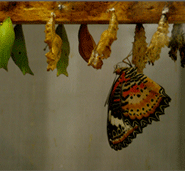This year, The Fuschia Tree's issues tackle 'The Unseen': seemingly invisible and tangential ideas that change the course of our lives. We began the month of February with Love. Of course. The most obvious and the most elusive of the unseens. Our current issue is on the thing that feeds our desire to love: Hunger. Our upcoming issues will explore other such infinite loops as Will, Form, Coincidence, Folly and more. If there is an Unseen that has preoccupied you, or affected you deeply and you would like to have us create stories around it, feel free to email us at . The Choice, after all, is yours.
Our current issue, Hunger: An Unusual Kitchen, is built in conjunction with our first Fuschia Tree Experience, A Not So Casual Kitchen, curated by our founding publisher, Chanda Chaudhary, at Mumbai's design venue, Anemos. The show is set of a a kitchen created by eclectic designers in which the dramas of hunger, food and eating play out. The stories in the issue are the noise of utensils banging against each other, the whistle of a pressure cooker, the curdle of drainage pipes, the chatter of hungry mouths and the final silence of satisfied stomachs.
Of this hunger, Simone Dinshaw says of Dualist Inquiry, with whom she has a curious conversation about the person behind the name, his inspirations and music-dreams: "We thought the hunger was the artist’s; the starving artist with the clawing in his core that drives him to create, to fill the empty spaces and silences with glimmers of his own world.
Siddhartha Kararawal's sculpture of a satin intestine interrupts hunger, and draws our attention to waste via the imagination, interlopers of whimsy, sarcasm and dark humor. Veeranganakumari Solanki reminds us of the politics of genetically produced food, "Politics itself is often referred to as fodder for the hungry – where when power corrupts it corrupts absolutely – and to get a job done one often has to “khilao” (feed / bribe)."
Avni Doshi writes the spooky story of Smriti Dixit's rice perfume, weaving a narrative of the impossibility to capture a thing that is so everyday as a grain. She writes: "(My mother told me that rice would never rise to a boil on the stove if you watched it. She said that it was a private process, a sort of war between the elements of fire and water. Rice actually had very little to do with it. The cooking was just the byproduct of the lovemaking or bloodshed, however you wanted to think of it)".
And finally, Payal Kapadia, an artist particularly inspired by food, selects her inspirations and their delectable use of food to tell bigger stories of things we can't see. Her slide-show spans Fellini and NS Harsha, reminding us that food and all the cultures that surround it, have been a source of wonder around the world, in medieval feasts and contemporary brunches.
So make some toast, apply some butter on it. Don't let it fall: it'll fall on the buttered side. Read. Listen to the clang of cups in the kitchen of your mind, and arrange them to dry.
With appetite,
Himali.And finally, Payal Kapadia, an artist particularly inspired by food, selects her inspirations and their delectable use of food to tell bigger stories of things we can't see.
Editor's Note.
Every sunbeam, every strain of music, every sapling and starfish is ultimately the regeneration of a previous something, a collection of somethings, taking on new shape. At the most indivisible level we can comprehend, all life is nothing more than atoms and molecules dancing their way through various forms. And if everything comes from something, it stands to reason that everything must go to something as well.
Read More
Illusion: Seeing Beyond Seeing
Meaning: In Search of Significance.
Melody: A Different Tune
Rhythm: Ordering Time


